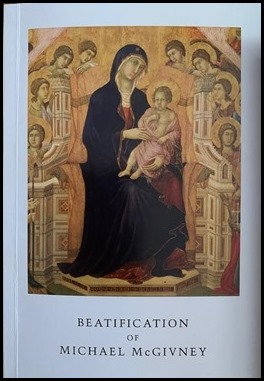Hello and welcome,
I want to share with you a statement issued Thursday as vote counting was still underway in the presidential election:
Today our country, one of the oldest democracies and most diverse societies in the world, should take pride in the success of the electoral process. We thank all the candidates who have participated in the elections and commend the historic voter turnout, a tribute to the citizens who voted in such striking numbers, in stark contrast to earlier elections. That encouraging sign has opened the way to begin a process of participation among all citizens however they voted. As Catholics, we are committed to the common good, social justice and the Gospel of Life. Participation in the political process is a sacred duty. In a country facing the threefold challenge of addressing a global pandemic, repairing a fractured economy and renewing a national commitment to the goals of racial justice and equality, the broad participation of citizens in the election should be a foundation for rebuilding our unity as a people.
The President and those who will serve with him have both the opportunity and the challenge of rebuilding civic trust, of providing a sense of hope in a time of social crisis, and of calling us all to share our best talents and energies in a common task. Our prayers should be with all those called to lead the country.
The task we face is not fully captured in the data, the numbers, charts and graphs; the task is also a spiritual challenge. As Pope Francis shared in the recent Encyclical Letter, “Fratelli Tutti,” we are called to promote “friendship and an acknowledgement of the worth of every human person, always and everywhere.” Each citizen, each person, across lines of color, ethnicity, faith and philosophy, can and should be asked to place solidarity over inequality, compassion over revenge, generosity over self-interest.
An election is never only about who wins and loses. It is always about a moment in time when a new beginning is possible. Such a beginning relies upon our best traditions and aspirations: belief in our common humanity and the unique dignity of each person in the land; beliefs which can bind us together, rich and poor, black and white, citizens and dreamers, women and men. We are now at a moment when a new beginning is not only possible but urgently necessary. The work at hand calls us to respect the opinions of others, to dialogue about differing perspectives, to seek reconciliation where there has been estrangement, to work for healing among the people of our country. I confidently believe that as a nation we can achieve these goals, to rise above our differences, to embrace our unity as brothers and sisters whose lives are a gift from God and who share a mission to build a just society.
We must not succumb to resentments based in divergent political views and divisions that have emerged from the stress of recent months. The challenge is always to transform a crowd into a community, a people who share a commitment to building a civilization of love and a culture that can sustain democracy, freedom and respect for human rights. Let us remember the unity and charity we are called to at the celebration of the Eucharist and in the proclamation of the Scriptures. Let us witness to the ideals of the Gospel, striving to have a positive impact on our families, communities and the nation in these crucial days. Let us follow Jesus’ call to love one another as He has loved us.
Saturday, I traveled to Hartford to participate in the Beatification Mass for Blessed Father Michael J. McGivney, the founder of the Knights of Columbus.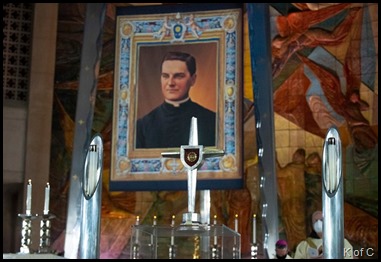
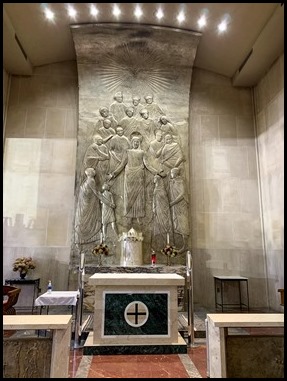
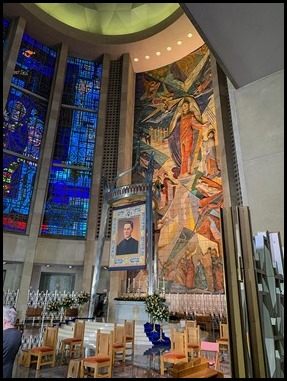
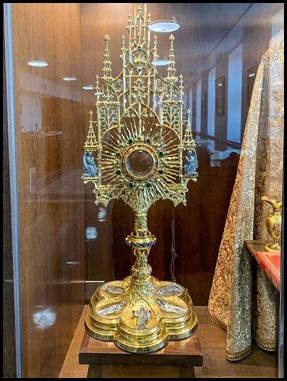 The beatification was held at Hartford’s Cathedral of St. Joseph. It was certainly disappointing not to be able to have a large beatification ceremony such as the one that was held in Detroit for Blessed Solanus Casey, where they filled a stadium with something like 80,000 people. But, of course, because of the pandemic, there was a very limited group allowed in the cathedral. The cathedral is very large, but with social distancing, attendance was limited to only about 200 people, and a large percentage of those were parish priests who were concelebrating.
The beatification was held at Hartford’s Cathedral of St. Joseph. It was certainly disappointing not to be able to have a large beatification ceremony such as the one that was held in Detroit for Blessed Solanus Casey, where they filled a stadium with something like 80,000 people. But, of course, because of the pandemic, there was a very limited group allowed in the cathedral. The cathedral is very large, but with social distancing, attendance was limited to only about 200 people, and a large percentage of those were parish priests who were concelebrating.
Cardinal Timothy Dolan of New York, Cardinal Joseph Tobin of Newark and myself were the three cardinals present, and there were also a number of bishops, including the local archbishop, Leonard Blair. The principal concelebrant was Cardinal Tobin, who was the representative of the Holy Father. He gave a beautiful homily and reflection on the life of Blessed Father Michael McGivney. 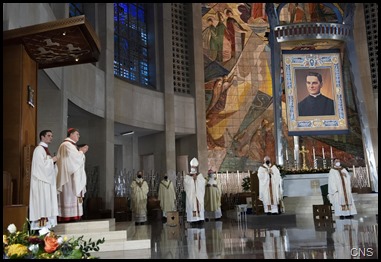
After Cardinal Tobin read the decree in Latin, Archbishop William Lori of Baltimore, who is the Supreme Chaplain of the Knights of Columbus, read the English translation of the decree. 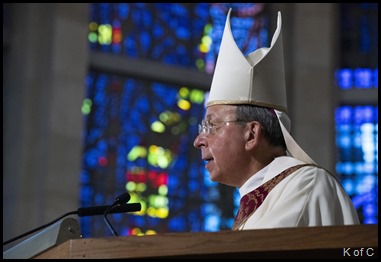
One of the more touching moments of the Mass was when young Mikey Schachle, who experienced a miraculous healing through the intercession of Blessed Father McGivney, presented one of the relics to Cardinal Tobin. I think we were all very touched by that.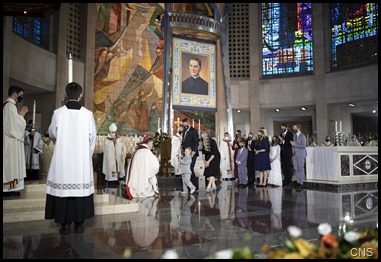
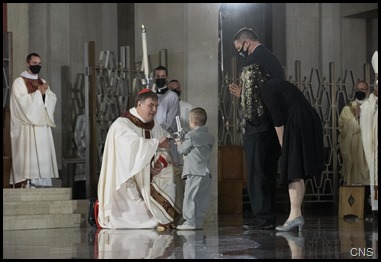
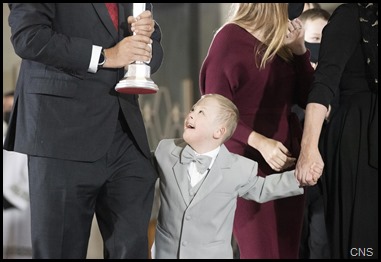
During the Mass, Supreme Knight Carl Anderson also offered a short biographical sketch of Father McGivney.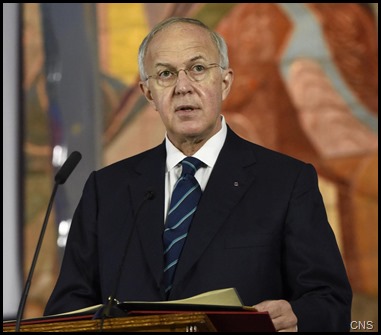
One detail of his life that I had forgotten was that Father McGivney died during a pandemic at 38 years of age. He was the oldest of 13 children and, before going to the seminary, worked in the same factory where his father had worked. In his life as a parish priest, he was very much dedicated to the immigrant population — mainly from Ireland at that time— and the founding of the Knights of Columbus was very much a way of trying to help that immigrant population to be strong in their Catholic faith and also have the material benefits that an insurance program would bring to them. So, he was very concerned about both the spiritual and material needs of his people.
In those days, people often died very young from working in very difficult and dangerous circumstances, and the death of the breadwinner of the family would often leave widows and orphans bereft of any kind of economic support. Father McGiveny was very conscious of that, and it was one of the motivating forces for starting the Knights of Columbus, which now has over 2 million members and is the largest Catholic fraternal organization in the world. 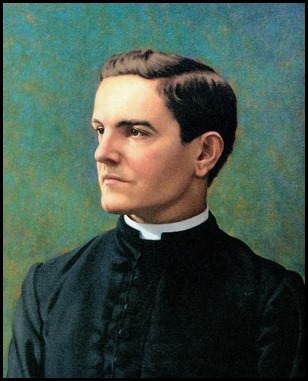
The Knights of Columbus have made such an extraordinary contribution to the Church at every level, particularly by strengthening the faith of their members and their families and through the many works of mercy they undertake. Their great support for the gospel of life, the institution of marriage and the Catholic priesthood are just some of the extraordinary contributions that the Knights are making, not just in the United States but throughout the world. I am hopeful that a year from now we will be able to have a celebration in the Archdiocese of Boston to commemorate this very important step of beatifying an exemplary parish priest who laid down his life for his people.
Sunday was, of course, All Saints Day, and I celebrated the Spanish Mass at the cathedral that morning. November always begins with All Saints and All Souls — days in which the Church, through the liturgy, reminds us of our brothers and sisters who are in the Church Triumphant and the Church Suffering, and that we are part of this same community of faith.
In my reflection at the Mass, I talked about the Tomb of the Unknown Soldier and said that our celebration of All Saints is something akin to that — a day when we celebrate our brothers and sisters who are part of that great cloud of witnesses but were not necessarily formally canonized. Rather, they are people who lived their baptismal commitment and their faith in such a way that they grew in love for God and holiness and are now in eternity in the presence of God. Pope Francis speaks about “the saints next door.” Well, on All Saints Day, we celebrate those very “saints next door” — our grandparents, godparents, neighbors and others who have gone before us marked with the sign of faith, who lived faith-filled lives of missionary discipleship and who now are in God’s presence for all eternity.
Monday was, of course, All Souls, and it is such a privilege for a priest to be able to celebrate three Masses on that day. The older I get, the more people I know who have passed into eternity — friends, relatives and clergy. So, it’s wonderful to have the three All Souls Day Masses to pray for all of our beloved dead.
Also on Monday, I was very happy to be invited to address the Episcopal Conference of Paraguay as part of my work with the Pontifical Commission for the Protection of Minors.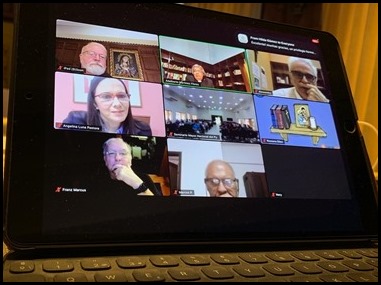
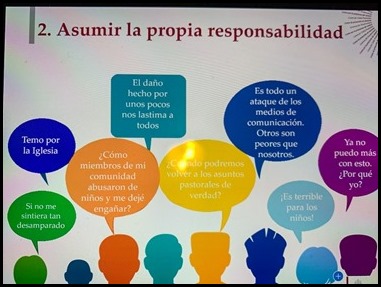
The president of the conference is Bishop Adalberto Martínez, who was one of my parishioners when I was a young priest. I had the joy of ordaining him to the diaconate and priesthood and being a co-consecrator at his episcopal ordination. He is now the president of the bishops’ conference of Paraguay, and he organized this plenary session. He also invited leadership from the various dioceses of the country. So, there were over 300 people participating in this session on safeguarding. 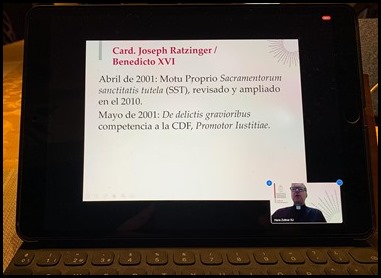
Fellow commission member Father Hans Zollner joined me in addressing the leaders of the Church in Paraguay who gathered for this conference. We were very happy to be able to participate and continue to be encouraged to see how bishops’ conferences throughout the world are working to respond to the challenge of safeguarding.
Tuesday, I attended a virtual meeting of the various committees for the board of directors of the Catholic University of America. All colleges and universities are facing great challenges during this time of the pandemic, but we are happy that Catholic University has risen to the occasion and is carrying out its mission.
Thursday, we had a meeting of our Presbyteral Council. Once again, we continued our dialogue with the priests on the best ways to prepare for celebrations at Christmastime in our parishes. Some of the issues include questions concerning the times and the number of Masses that are held, but there is also the question of establishing a preregistration system for Masses. We don’t want people coming in large numbers to a particular Mass and having to be turned away. So, there are many details that need to be worked out. The issue is being discussed by our priests in the vicariate meetings. I will discuss it again with the vicars forane, and we will come up with a final plan.
Until next week,
Cardinal Seán

